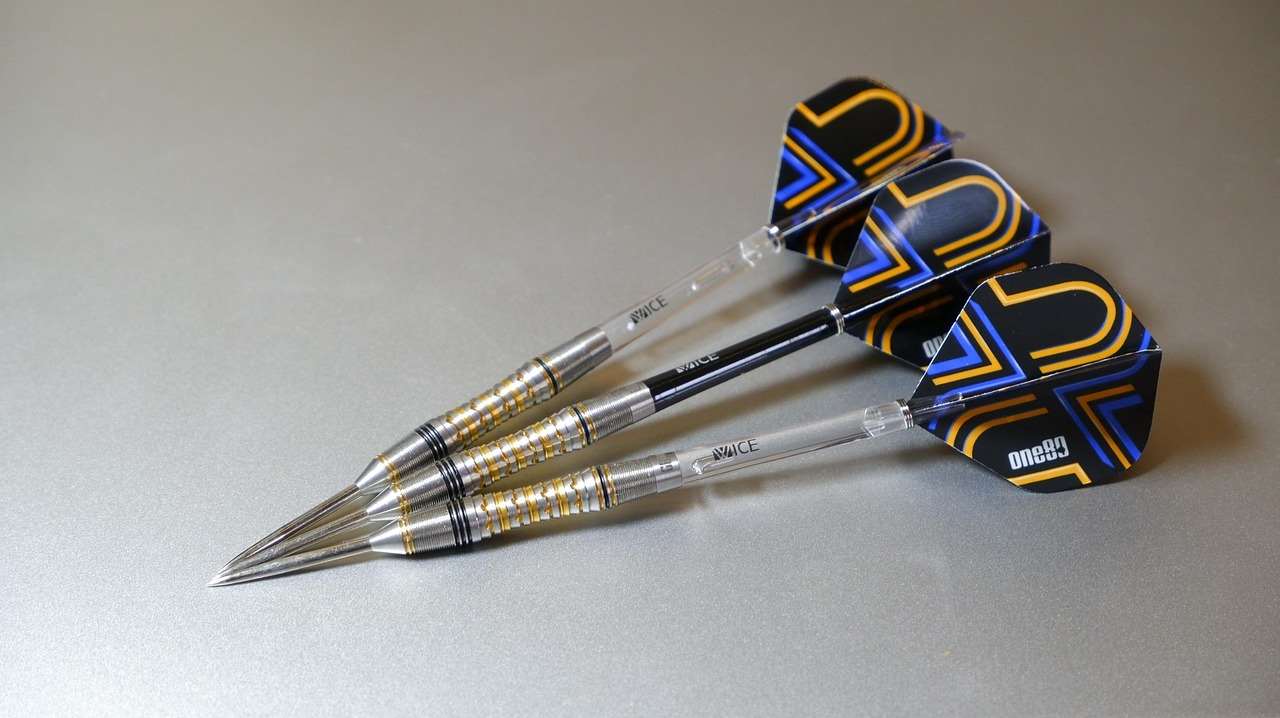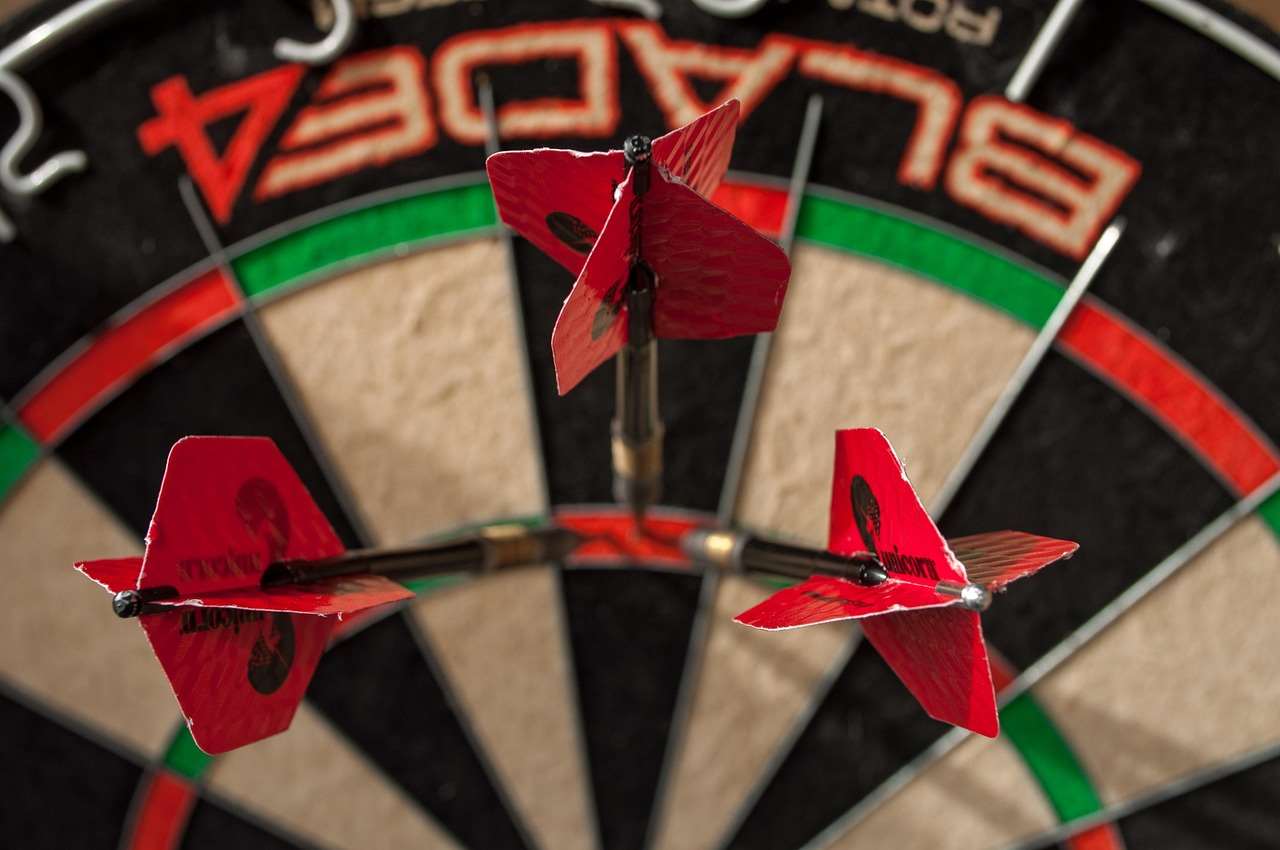Improving mental math darts scoring requires a blend of strategy and quick calculation; mastering a few key techniques can dramatically boost your performance. This article will explore practical strategies, mental math tricks, and practice drills to help you sharpen your scoring skills and dominate the oche.
⚠️ Still Using Pen & Paper (or a Chalkboard)?! ⚠️
Step into the future! The Dart Counter App handles all the scoring, suggests checkouts, and tracks your stats automatically. It's easier than you think!
Try the Smart Dart Counter App FREE!Ready for an upgrade? Click above!
Strategies for Improving Mental Math Darts Scoring
Darts, at its core, isn’t just about throwing accurately. It’s about strategic thinking and, crucially, lightning-fast mental math. The ability to quickly calculate your remaining score, potential outs, and the best path to victory is paramount to success. Here are some key strategies to elevate your game and focus on improving mental math darts scoring:
- Pre-Planning Your Outs: Before you even approach the oche, mentally map out potential outshots. Knowing which combinations of darts will leave you on a double for the win significantly speeds up your in-game calculations.
- Simplifying Subtraction: Break down complex subtractions into smaller, more manageable chunks. For example, instead of subtracting 57 from 170 in one go, subtract 50, then 7. This incremental approach reduces the mental load.
- Utilizing the Dartboard’s Layout: Familiarize yourself with the dartboard’s layout to quickly identify common scores and combinations. Knowing that the numbers opposite each other always add up to 20 can be a surprisingly useful shortcut.
To understand the basics, consider reviewing Basic Darts Fundamentals for Beginners.

Mental Math Techniques for Faster Calculations
Improving mental math darts scoring often comes down to mastering specific arithmetic techniques. Practice these regularly to make them second nature:
- Number Bonds to 100: Knowing your number bonds to 100 (e.g., 63 + 37 = 100) is crucial for quickly calculating scores remaining in the 100-170 range.
- Multiplying by 3 Mentally: Practice quick multiplication by 3. This is particularly important when targeting trebles. Try breaking down the number. For example, to multiply 17 by 3, think (10 x 3) + (7 x 3) = 30 + 21 = 51.
- Rounding and Adjusting: Round numbers up or down to the nearest 10, calculate, and then adjust. For example, to subtract 38 from 85, think 85 – 40 = 45, then add 2 to get 47.
Another key aspect is being able to quickly perform subtraction in darts. This is the core of calculating your score remaining and planning your strategy. Practice subtracting common dart scores (20, 60, 41, etc.) from various starting scores (501, 301, etc.).
Practice Drills to Sharpen Your Scoring Skills
Theory is important, but consistent practice is essential for truly improving mental math darts scoring. Here are some effective practice drills you can incorporate into your routine:
- The 170 Drill: Start at 170 and try to check out in as few darts as possible. This forces you to calculate various high-pressure combinations.
- The Round the Board (Doubles/Trebles) Drill: Go around the board, aiming for each double or treble in sequence. This reinforces your familiarity with the board and helps improve accuracy alongside your mental math.
- Score Call Drill: Have someone call out random scores (e.g., 45, 62, 27) and quickly calculate what you would need to hit to leave a specific double (e.g., double 20).
Remember to vary your practice drills to keep things interesting and challenging. And don’t forget to track your progress to see how you’re improving your darts strategy over time.

Advanced Techniques for Competitive Play
Once you’ve mastered the basics, you can explore more advanced techniques to gain a competitive edge. These techniques require a solid foundation in mental math and a deep understanding of dartboard strategy. Consider these points to further assist you in improving mental math darts scoring:
- Calculating Probabilities: Experienced players often subconsciously calculate the probabilities of hitting certain targets. This helps them make informed decisions about which targets to aim for, especially under pressure.
- Opponent’s Score Awareness: Always be aware of your opponent’s score and potential outs. This allows you to adjust your strategy accordingly and potentially block their checkout attempts.
- Strategic Busting: Sometimes, it’s strategically advantageous to “bust” your score intentionally to reset your position and gain a tactical advantage. This requires careful calculation and an understanding of game dynamics.
Consider how to go about How to make darts fairer with handicap rules when organizing a tournament.
The Importance of Focus and Concentration
Even the best mental math skills are useless without focus and concentration. Darts is a mental game, and the ability to stay present and focused is crucial for consistent performance. Here are some tips for improving your mental game:
- Mindfulness Meditation: Practicing mindfulness meditation can help you improve your focus and reduce anxiety.
- Pre-Game Rituals: Develop a pre-game ritual to help you get into the right mental state before each match.
- Positive Self-Talk: Use positive self-talk to build confidence and stay motivated, especially during challenging situations.
Learn about Fun dart game variations with modified rules to keep your practice engaging.

Utilizing Technology to Enhance Your Training
In today’s digital age, technology can be a valuable tool for improving mental math darts scoring. Several apps and online resources can help you practice your calculations and track your progress:
- Darts Scoring Apps: These apps automatically track your score and provide real-time statistics, allowing you to focus on your game.
- Mental Math Training Apps: Many apps are designed to improve your mental math skills in general, which can directly benefit your darts game.
- Online Darts Calculators: Use online calculators to verify your calculations and identify potential errors.
Practicing Under Pressure
Ultimately, the true test of your mental math skills is how well you perform under pressure. Simulating real-game scenarios in your practice sessions is crucial for building confidence and resilience. Consider these strategies to further assist you in improving mental math darts scoring:
- Play Against Stronger Opponents: Playing against more skilled opponents forces you to elevate your game and think more strategically.
- Simulate Match Conditions: Practice in noisy environments or with distractions to simulate the pressure of a real match.
- Set Performance Goals: Set specific, measurable, achievable, relevant, and time-bound (SMART) goals for your practice sessions to stay motivated and focused.

Tracking Progress and Analyzing Performance
To effectively track your improvement in mental math darts scoring, consistent recording of your performance metrics is key. This data provides valuable insights into your strengths and weaknesses, enabling you to tailor your practice accordingly. Focus on recording these metrics:
- Average Score Per Dart (SPD): Track your SPD over time to monitor your overall scoring efficiency.
- Checkout Percentage: This metric reflects your ability to finish legs efficiently. A higher checkout percentage indicates improved mental math skills and strategic decision-making.
- Number of Darts at a Double: Reducing the number of darts you need to reach a double is a direct indicator of improved scoring and mental calculation.
Analyzing this data allows you to identify areas where you need to focus your training efforts. For example, if your checkout percentage is low, you might need to spend more time practicing outshots and darts combinations.
Staying Motivated and Enjoying the Process
Improving mental math darts scoring requires dedication and consistent effort. It’s important to stay motivated and enjoy the process to avoid burnout. Set realistic goals, celebrate your progress, and find ways to make practice fun.
- Join a Darts League: Playing in a league provides a competitive environment and opportunities to socialize with other players.
- Set Personal Challenges: Challenge yourself to beat your personal best scores or master new outshots.
- Reward Yourself: Reward yourself for achieving your goals to stay motivated and maintain a positive attitude.
Learn more about Alternative darts rules for home play for fun practice variations.

Conclusion: Mastering Mental Math for Darts Dominance
Improving mental math darts scoring is a journey that requires dedication, practice, and a strategic approach. By mastering the techniques outlined in this article, including simplifying subtraction, pre-planning outs, and consistently practicing drills, you can significantly enhance your scoring ability and gain a competitive edge. Remember, focus, concentration, and a positive attitude are just as important as technical skill. Track your progress, analyze your performance, and stay motivated by setting achievable goals. Now, it’s time to put these strategies into practice and watch your darts game soar. Want to improve your game further? Check out adapting darts rules for beginners to find creative ways to enhance your practice.
Hi, I’m Dieter, and I created Dartcounter (Dartcounterapp.com). My motivation wasn’t being a darts expert – quite the opposite! When I first started playing, I loved the game but found keeping accurate scores and tracking stats difficult and distracting.
I figured I couldn’t be the only one struggling with this. So, I decided to build a solution: an easy-to-use application that everyone, no matter their experience level, could use to manage scoring effortlessly.
My goal for Dartcounter was simple: let the app handle the numbers – the scoring, the averages, the stats, even checkout suggestions – so players could focus purely on their throw and enjoying the game. It began as a way to solve my own beginner’s problem, and I’m thrilled it has grown into a helpful tool for the wider darts community.